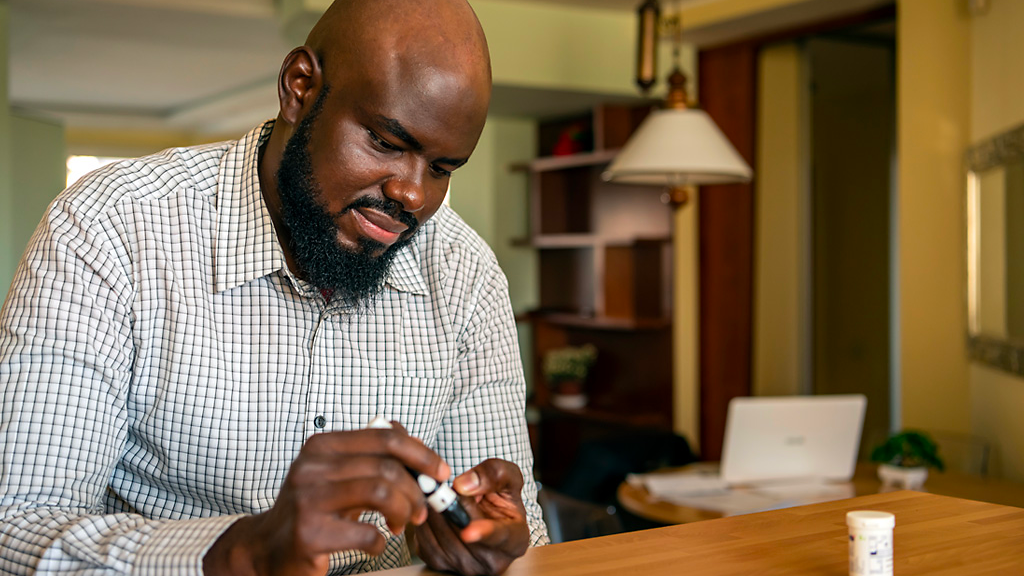Yes, you can qualify for all types of life insurance with any type of diabetes. However, you may have to go through extra steps in the underwriting process, and your condition may affect the coverage amount you qualify for and your premium payments.
Life insurance for diabetics
Diabetes does not disqualify you from getting life insurance coverage. But it is a preexisting condition, so your underwriting process may be more complicated, and your options may be more limited. Here’s what you need to know.

Can you get life insurance if you have diabetes?
Yes, you have many options for life insurance. But there are a few extra considerations that may go into the process. Diabetes is a complex illness. Some diabetics struggle with complications, while others have their diabetes well-managed and under control. Insurance providers will look at the specifics of your situation when you apply for a policy.
During the application process, you’ll usually go through medical underwriting, which typically includes a medical questionnaire, a physical exam, and a review of your health records. These steps are important because they help the insurance company determine a fair insurance rate. Diabetes is a preexisting condition that can affect your access to certain policies and certain coverage amounts. It also can affect the premium rates you pay. Being aware of these extra considerations before you apply will help you find the right policy for you.
What is a preexisting condition for life insurance?
A preexisting condition is any health issue you have before you apply for a life insurance policy. These conditions vary widely and may include heart disease, high blood pressure, kidney disease, cancer, or mental health conditions like depression or anxiety. In order to price life insurance policies fairly for everyone, many preexisting conditions, including diabetes, are factored into your policy and can affect coverage amounts and premium payments.
Why diabetes raises life insurance rates
Diabetes has a wide range of complications that can impact your health and longevity, even if you have it well-managed. Every case is different, and a life insurance provider will look at your type of diabetes, how it’s controlled, its severity, and other health factors to help adjust your policy and premiums.
Does your type of diabetes affect the cost of life insurance?
Yes, the type of diabetes you have can affect the cost of life insurance. Insurance companies often distinguish between type 1 and type 2 diabetes when assessing your eligibility and determining your premium rates.
Type 1: Type 1 diabetes can be more difficult to control. It typically requires insulin therapy from an early age and can carry a higher perceived risk. So people with type 1 diabetes may face higher life insurance premiums than those with type 2 diabetes.
Type 2: With type 2 diabetes, which is more common and usually develops later in life, the effect on your premiums often comes down to how well the condition is managed, how long you have had it, and your overall health. If your Type 2 diabetes is well-controlled through lifestyle adjustments and medication, you should be able to secure more favorable premium rates.
Gestational: This type of diabetes occurs during pregnancy and usually goes away after childbirth. Therefore, it typically has less impact on life insurance premiums, and it may not even be considered a preexisting condition. Even so, it might be advisable to wait a few months for it to clear before applying for life insurance.
How can I reduce the cost of my life insurance as a diabetic?
Regardless of the type of diabetes, insurers will assess how well your condition is managed. The best thing you can do is to get your diabetes under control, follow your healthcare provider's recommendations, and lead as healthy a lifestyle as possible. In addition to the type of diabetes, insurers consider health factors like blood pressure, cholesterol levels, and any related complications. Your overall health also plays a significant role in determining premium rates.
Different insurance companies will have different underwriting guidelines and policies when it comes to diabetes. It's essential that you shop around and work with an experienced insurance agent to help you navigate the application process and find the best policy for your specific situation.
Types of life insurance for diabetics
Regardless of your diabetes, you have many options for life insurance. Here is a brief overview of the types of policies you can look for:
Whole life insurance
Whole life insurance provides protection with premium rates that are guaranteed not to increase in the future. That makes it an attractive option, since you won’t lose coverage if your condition worsens as long as you continue to make premium payments. In addition, whole life accumulates cash value, which helps build wealth over time. As your protection needs change in the future, you can take withdrawals from this cash value or borrow against it to help with planned or unexpected costs during a lifetime. Keep in mind that accessing cash value will reduce the available cash surrender value and death benefit and that policy loans accrue interest.
Term life insurance
Term life insurance provides coverage for a specific period, such as one, 10, or 20 years. It generally has smaller premium payments than whole life insurance, but after the term is up, there is no guarantee that you’ll qualify for coverage again. Term life is best suited for covering specific scenarios. For example, you may want to have a term policy in place until your children graduate from college or until your mortgage is paid off.
No-exam life insurance
You also may have the option of getting life insurance without a medical exam. You will need to disclose your diabetes and will probably be required to fill out a health questionnaire. No-exam life insurance usually offers more limited coverage amounts and carries the potential for higher premiums.
Burial insurance
This is also called final expense insurance. It’s typically a smaller whole life policy designed to cover funeral and end-of-life expenses, which often exceed $10,000. Policies are generally for small amounts, but they can help lessen your family’s burden during what would be a difficult time.
Life insurance and diabetes FAQs
Yes. Whole life is an attractive option for diabetics, because once you qualify it offers a guaranteed death benefit, and your premiums will never change, even if your condition worsens.
That varies from one life insurance company to another. Generally, each provider assesses your A1C levels as part of the overall evaluation of your health and risk factors.
RELATED CONTENT
Discuss your life insurance options with a financial professional.
We can answer all your questions and help determine which policy is right for you.
Guarantees are based on the claims-paying ability of the issuer.
New York Life Insurance Company (NY, NY)



